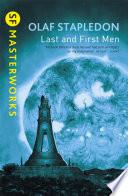Source: Last and First Men (1930), Chapter VII: The Rise of the Second Men; Section 3, “The Zenith of the Second Men” (p. 112)
Quotes from book
Last and First Men

Last and First Men: A Story of the Near and Far Future is a "future history" science fiction novel written in 1930 by the British author Olaf Stapledon. A work of unprecedented scale in the genre, it describes the history of humanity from the present onwards across two billion years and eighteen distinct human species, of which our own is the first. The book employs a narrative conceit that, under subtle inspiration, the novelist has unknowingly been dictated a channelled text from the last human species.
Source: Last and First Men (1930), Chapter II: Europe’s Downfall; Section 1, “Europe and America” (pp. 34-35)
Source: Last and First Men (1930), Chapter XIII: Humanity on Venus; Section 1, “Taking Root Again” (p. 195)
Source: Last and First Men (1930), Chapter XV: The Last Men; Section 3, “A Racial Awakening” (pp. 228-229)
Source: Last and First Men (1930), Chapter III: America and China; Section 1, “The Rivals” (p. 43)
Source: Last and First Men (1930), Chapter XIV: Neptune; Section 1, “Bird’s-Eye View” (p. 206)
Source: Last and First Men (1930), Chapter I: Balkan Europe; Section 1, “The European War and After” (p. 17)
Source: Last and First Men (1930), Chapter VII: The Rise of the Second Men; Section 3, “The Zenith of the Second Men” (pp. 112-113)
Source: Last and First Men (1930), Chapter II: Europe’s Downfall; Section 1, “Europe and America” (p. 33)
Source: Last and First Men (1930), Chapter I: Balkan Europe; Section 1, “The European War and After” (p. 17)
Source: Last and First Men (1930), Chapter XII: The Last Terrestrials; Section 1, “The Cult of Evanescence” (p. 176)
Source: Last and First Men (1930), Chapter XV: The Last Men; Section 4, “Cosmology” (p. 229)
Source: Last and First Men (1930), Chapter III: America and China; Section 2, “The Conflict” (p. 50)
Source: Last and First Men (1930), Chapter I: Balkan Europe; Section 1, “The European War and After” (p. 18)
Source: Last and First Men (1930), Chapter XIII: Humanity on Venus; Section 2, “The Flying Men” (p. 199)
Source: Last and First Men (1930), Chapter I: Balkan Europe; Section 3, “Europe After the Anglo-French War” (p. 26)
Source: Last and First Men (1930), Chapter VII: The Rise of the Second Men; Section 3, “The Zenith of the Second Men” (p. 110)
Source: Last and First Men (1930), Chapter XII: The Last Terrestrials; Section 1, “The Cult of Evanescence” (p. 176)
Source: Last and First Men (1930), Chapter XV: The Last Men; Section 4, “Cosmology” (p. 231)
Source: Last and First Men (1930), Chapter II: Europe’s Downfall; Section 3, “Europe Murdered” (p. 41)